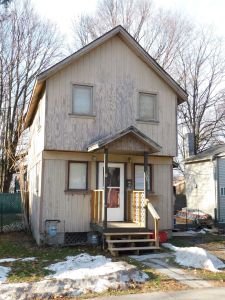 It occurred to me that when I have written about my mother’s ancestors, I’ve almost always written about my maternal grandmother’s side but little about my mom’s paternal relatives. The reasons are several.
It occurred to me that when I have written about my mother’s ancestors, I’ve almost always written about my maternal grandmother’s side but little about my mom’s paternal relatives. The reasons are several.
Among them is that many of the folks on her mother’s side, at some point, lived at 13 Maple Street in Binghamton, NY. That’s where my mom grew up, and my sisters and I spent a lot of time as kids. Some, including my great-great-grandfather, James Archer, were buried at Spring Forest Cemetery, maybe 300 meters from 13 Maple Street. And many of their names are recorded in the family Bible.
However, my mother’s father, Clarence Williams (b. 1886), was largely absent. He had married Gertrude Yates (b. 1897) in 1926, and my mother was born in 1927. But Gert’s mother, Lillian Archer Yates Holland (1866-1938), and perhaps her grandmother Harriet Bell Archer (1838-1928) disapproved of Clarence and drove him away, we had been told. Was it because he was so much older than Gert?
My mom was not devoid of male role models in her household. Her maternal uncle Ed Yates and Maurice Holland, Lillian’s second husband after her first husband Edward died, were around.
Her dad
Her father, though, was out of the immediate picture. Clarence Williams, who fought in World War I, was a machine shop laborer.
He lived with his mother, Margaret (or Marguerite) Collins Williams (1866-1931), in Owego, NY, according to the 1930 Census. Her parents were Irish, though I don’t have their first names or her mother’s maiden name, and I’ve been actively looking.
An odd thing, though. If there are any photos of my mom with ANY of her paternal relatives, even her father, I’m unaware of them.
According to Selective Service records, Clarence resided in Deposit, near Binghamton, with his father, Charles (1863-1944), in 1942. But he was living with his wife Laura back in Owego, in Margaret’s old house, in 1950.
Or were they married? My mother told of her and her mother visiting Clarence’s home in early 1958 and not being allowed to enter the house by a woman. His July 1958 death certificate says he was divorced, but was that from Margaret or both Margaret and Laura? The house became my grandmother’s after Clarence died; it is pictured above from more recent times. I attended his funeral in Owego.
When I was at my Grandma Williams’ funeral in Binghamton in May 1982, more than one of her in-laws said, “I bet you don’t remember me, do you?” That would be correct since I last saw them when I was five.
Her great-grandparents
 Charles Williams, the elder, married Margaret Collins c. 1883. They were together in 1915 but not in 1920. I assume they divorced since the elder Charles married Margaret Greenleaf in 1921, as I noted.
Charles Williams, the elder, married Margaret Collins c. 1883. They were together in 1915 but not in 1920. I assume they divorced since the elder Charles married Margaret Greenleaf in 1921, as I noted.
Charles’s second marriage license led me to HIS parents Daniel Williams (1829-1893) and Sarah Benson (b. 1833), who were born in Maryland.
From the book An Evergreen Companion: “Sometime before 1860 [Daniel] lived in the Tioga County Town of Barton with his wife Sarah and five children. [The middle three were born in Canada.] Late in the Spring of 1863, he registered to serve the Union Cause in the War of the Rebellion (Civil War).
“He enlisted on August 23, 1864, and became a member of Company F of the 43rd United States Colored Infantry Regiment. The 43rd served with special distinction in the battles around Richmond and Petersburg, VA, capturing a Confederate battle flag and rescuing a Union flag at the Battle of the Crater. The regiment lost 239 men during service; 188 died from disease. Williams mustered out of service in September of 1865.”
What did Mom know?
I know my mom knew a lot about her mother’s lineage. But what did she know of her father’s line? What was her relationship with her father? She was familiar with her uncle Charles playing baseball, though I had never heard any details.
How well did she know her paternal grandparents? Was she aware she had TWO great-grandfathers who fought in the Civil War? These are questions that I’d love to ask her but can’t since she died in 2011.
Today would have been my mom Trudy Green’s 96th birthday.

 Nomenclature is “the
Nomenclature is “the  I had heard this vague story that my mom could have gone to college. By vague, I mean I don’t know where she would have attended. Moreover, someone (who?) was willing to pay for it. Further, the reason she didn’t go to college or join Girl Scouts was her hair. Specifically, the fact that her hair would become kinky when wet.
I had heard this vague story that my mom could have gone to college. By vague, I mean I don’t know where she would have attended. Moreover, someone (who?) was willing to pay for it. Further, the reason she didn’t go to college or join Girl Scouts was her hair. Specifically, the fact that her hair would become kinky when wet. It occurred to me that I’ve written a few times about my paternal grandma Agatha Green. For instance,
It occurred to me that I’ve written a few times about my paternal grandma Agatha Green. For instance, 
